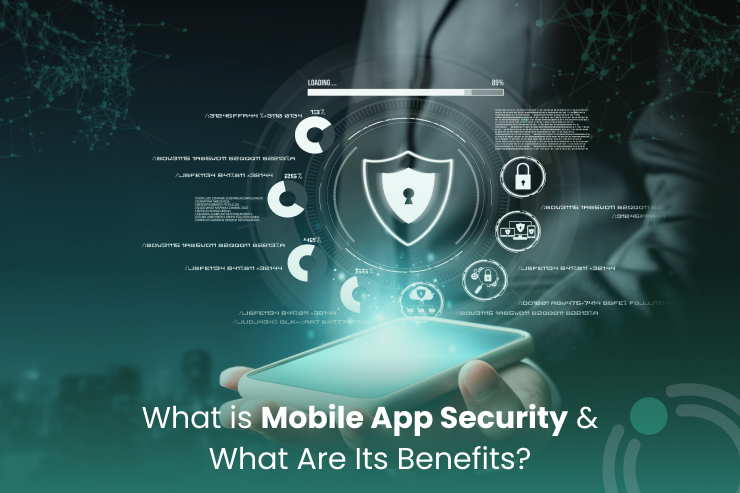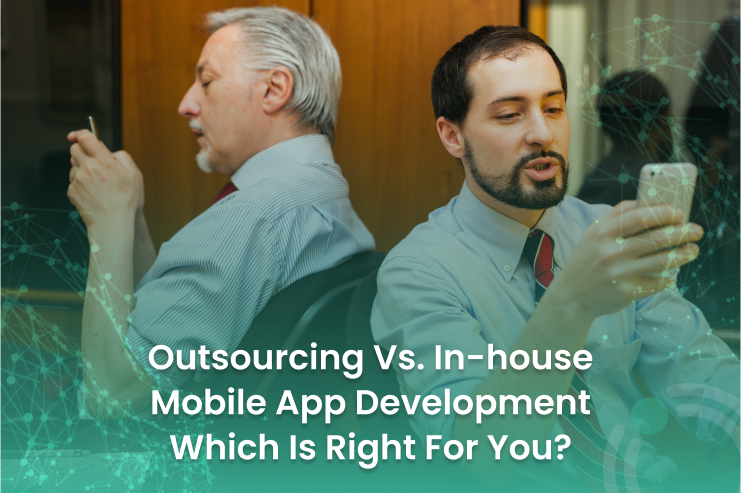The majority of users depend on mobile applications for most of their digital tasks over traditional desktop applications. As per internet resources, back in 2015, in the U.S. alone, users spent 54% of their digital media time on mobile devices dynamically using mobile apps. These applications have access to huge amounts of user data, much of which is complex data and must be secured from unauthorized access.
Therefore, with the increase in mobile use, mobile app security has become one of the most demanded aspects of modern Mobile App Development Services. The reason for this is apparent: mobile devices have become an important part of our daily lives. They contain so much personal data, such as photos, access to email and social media accounts, payment details, and so on. Because of this, every other mobile app company is using an all-encompassing measure to secure such information.

Enhance app security—partner with our developers now!
What Is Mobile App Security?
In terms of mobile applications, security refers to a detailed set of measures, standards, and practices. Some of those are general and apply to all types of devices and applications. Others are intended precisely for mobile devices and emphasize their unique features, such as the existence of cameras, different sensors, GPS, etc. Mobile security features are planned to secure both hardware and software from unauthorized access, data stealing, and several other threats.
All well-known mobile platforms offer security controls designed to assist software developers build secure applications. However, it often depends on the Mobile app company to select from numerous security options. Insufficient screening can result in the installation of security features that are easily exploited by adversaries.
Common concerns impacting mobile apps involve:
- Keeping or accidentally escaping sensitive data in ways that it could be read by other applications on the user’s phone.
- Employing poor authentication and authorization checks that could be evaded by malevolent applications or users.
- Utilizing data encryption methods that are identified as susceptible or can be easily fragmented.
- Transferring complex data without encryption using the Internet.
These concerns could be misused in several ways; for instance, by malicious applications on a user’s device, or by an aggressor who has access to the same WiFi network as an end user.
Importance of Mobile App Security
Developers comprehend the significance of mobile app security, but this is not comprehensively assumed. Beyond an increasing rate of mobile fraud, there are numerous other reasons that financial institutions should take mobile app security seriously and are obligated to evolve a comprehensive strategy.
Consumers must be cautious of the details they reveal and the data they download when browsing the internet, but business experts need to be attentive as well. Mobile devices are almost always on, always close to you, and collect astonishing amounts of personal details as well as delicate data and documents, making them a goldmine for attackers.
Mobile apps might be presuming in the permissions they ask for. For instance, why might a weather app need access to your camera or microphone? And might an attacker find a vulnerability in that app that offers them access to the camera or microphone in order to lead industrial surveillance?
Best practices
Data Encryptions
Encrypting data across applications is important to prevent visibility due to OS or device susceptibility. There are two methods for encrypting data that are symmetric and asymmetric encryption. Symmetric encryption uses the same security key for encryption and decryption, while asymmetric encryption has different keys. Secure coding is another best method used for mobile app security. Mobile apps often gather unstructured data in local file systems or databases, which can be accessed by attackers without encryption. To diminish this risk, mobile app data encryption can be implemented using SQLite Database Encryption Modules or file-level encryption throughout multiple platforms. However, whichever approach you follow encrypt all crucial data before collecting it on the server or database, and utilize advanced cryptography methods. Also, perform penetration testing on the mobile app before it goes live for simplified security.
Secure Codes
Every application at its center has an architecture built on numerous pieces of code. So, when it comes to mobile app security, secure codes can be exceptionally important.
As per the report from IT Pro Portal, 82% of the susceptibilities perform in the application source code. This means that you must ensure that the source code is bug-free and there are no vulnerabilities.
Hiring a professional app designer can provide you the peace of mind that your mobile app security is sound. Along with having a professional onboard, mobile application testing is the best way to make sure that the code is safe, and no bugs are present that hackers can misuse.
User Authentications
Mobile applications heavily rely on user-generated content (UGC), which can be vulnerable to cyber-attacks without proper user authentication systems. Hackers can exploit social engineering attacks to gain access to user information, making malevolent injection easier. To protect against this, mobile applications should use multi-factor authentication with an additional layer of security, such as one-time passwords, tokens, or security keys. Adherence to these security measures is crucial for mobile application security, as it ensures users’ identity is validated through a two-factor authentication process.
Compliance and Integrity
Mobile apps must clear security parameters and meet specific requirements, with developers monitoring these measures under app store direction. Modern smartphones use app stores to allocate signed apps to users or software that requires code signing, ensuring pre-vetted applications are distributed. Developers can acquire their apps to the store, validate their individualities and application’s security needs, and if everything aligns with the operating system’s rules, the app is available for download. There are numerous coding sign options available, and developers can quickly obtain a cost-efficient code signing certificate to ensure compliance and integrity. This certificate helps developers encrypt information related to their identity, which is decrypted through a public key provided to users. App security is also crucial when dealing with APIs or Application Programming Interfaces.
Secure and Authorized APIs
APIs are important to integrate third-party services and also enhance functionality. It allows diverse systems to interact with each other and enable data exchange. However, for better app security, you require secure and authorized APIs that grant an attacker privilege to put your data at risk. The best way to ensure API security is to utilize data access authorizations. Use of unauthorized APIs can also get your app banned and removed from app stores. Similarly, ensure to follow the specific platform guidelines for authorized APIs for heightened security and compliance.

Trust us for high-security mobile app development!
Security Triggers
You are allowed to use specific triggers to prepare your systems in case of interfering with the application source code. For instance, AWS Lambda functions can be utilized to make sure cloud-native application interfering or spiteful injection alerts.
Data Privileges
Another way to ensure that your application is not exposed to malicious cyber-attacks is by recognizing data privileges. Use the approach of slightest privilege where you offer sensitive data access to inadequate users. This will ensure that a person without data access and with malevolent intent gets access to sensitive information.
Secure Data in Transit
When transferring data from a mobile device to server-side endpoints, attackers can possibly interrupt the HTTP communication. There are numerous ways to safeguard this data in transit, including Transport Layer Security (TLS) and Certificate Pinning. TLS initially progressed from Secure Socket Layers (SSL), and this method allows you to encrypt data in transit utilizing public key cryptography. While TLS does not essentially safe the data on end systems, it avoids data access during digital transit. Certificate Pinning utilizes a set of public keys to cross-check whether a digital certificate resembles with the domain name that it’s demanding. When selecting a method to protect your data in transit, consider the requirements of your mobile app, the delicacy of your data, and possible security-related concerns.
Benefits of Mobile App Development
-
Better data protection against identity theft
Digital identity theft can occur through obtaining digital duplicates of identification documents, social security numbers, and passwords for accounts. This data can be obtained from a person’s mobile device through internal and cloud storages or avoiding two-step verification using their phone number. Therefore, security measures must be taken for mobile applications that handle sensitive user information, including login credentials, identifying data, financial details, and other private details, to prevent such incidents.
-
Higher safety of banking details
Several mobile apps that offer access to goods and services store payment details, such as credit card numbers, delivery addresses, order lists, and so on. So, a software client of your preferred taxi service, fast food chain, or online shop may possibly leak this personal information if an app has security errors. However, suitable methodologies to Quality Assurance diminish such risks.
-
Improved privacy of personal media and messages
Mobile devices often store numerous photos and videos, which can be used for blackmail or disinformation if they fall into the wrong hands. Modern mobile applications enable users to share photos, videos, or text through messages. Mobile app security ensures personal communication is encrypted and media files are invisible to intruders.
-
Enhanced resistance to massive infrastructure breaches
Over the past decade, global corporations have experienced large-scale online breaches, stealing millions or billions of data archives. These databases are often sold in the Darknet, leading to personalized attacks and potential scams. Corporations are hesitant to admit such breaches, putting users’ privacy at risk. However, software updated to security standards can help prevent data escape during such events.
-
Increased protection against hardware stealing
Mobile devices, with advanced sensors and AI features, are becoming increasingly spying tools when managed remotely. They can record and transfer data, provide geolocation, and even share audio and video data. Malware infested devices can become part of botnets, enabling malicious activities like spamming and DDoS attacks. During the cryptocurrency frenzy, smartphones and tablets were used for mining, but this has weakened. Mobile app security ensures software can effectively ward off attacks and identify infected files or links, alerting users.
Conclusion
Increased reliance on mobile phones has led to an increase in mobile security risks. Companies are now utilizing traditional technologies to safeguard their vital information, making the optimization of security methods in mobile app development services important. Also, understanding potential security risks and learning the right approaches to keep phones safe are important for making sure mobile app development security. Secure coding practices, constant security testing, penetration tests, and an attention on positive user experiences can considerably enhance security. To attain these facilities, one should look for the best mobile app company that can make required changes within their budget or ensure that developers are following robust security measures while building their app.

Build secure mobile apps with our expert team!




